SWTP620 - Guiding Ethical Decisions: Theories in Social Work Practice
VerifiedAdded on 2023/06/14
|11
|3035
|442
Essay
AI Summary
This essay explores the role of ethical theories in guiding ethical decision-making within contemporary social work practice. It discusses key concepts such as the Code of Ethics by the AASW, deontological theory, utilitarianism, and the theory of justice, analyzing their strengths and weaknesses. The essay also addresses ethical dilemmas commonly faced by social workers, such as issues of confidentiality and informed consent when dealing with sensitive cases like domestic violence. By examining these theories and dilemmas, the essay aims to provide a comprehensive understanding of the ethical considerations essential for effective social work practice, highlighting the importance of values, professional integrity, and responsible decision-making in promoting the well-being of individuals and communities. This document is available on Desklib, a platform offering a range of study tools and resources for students.
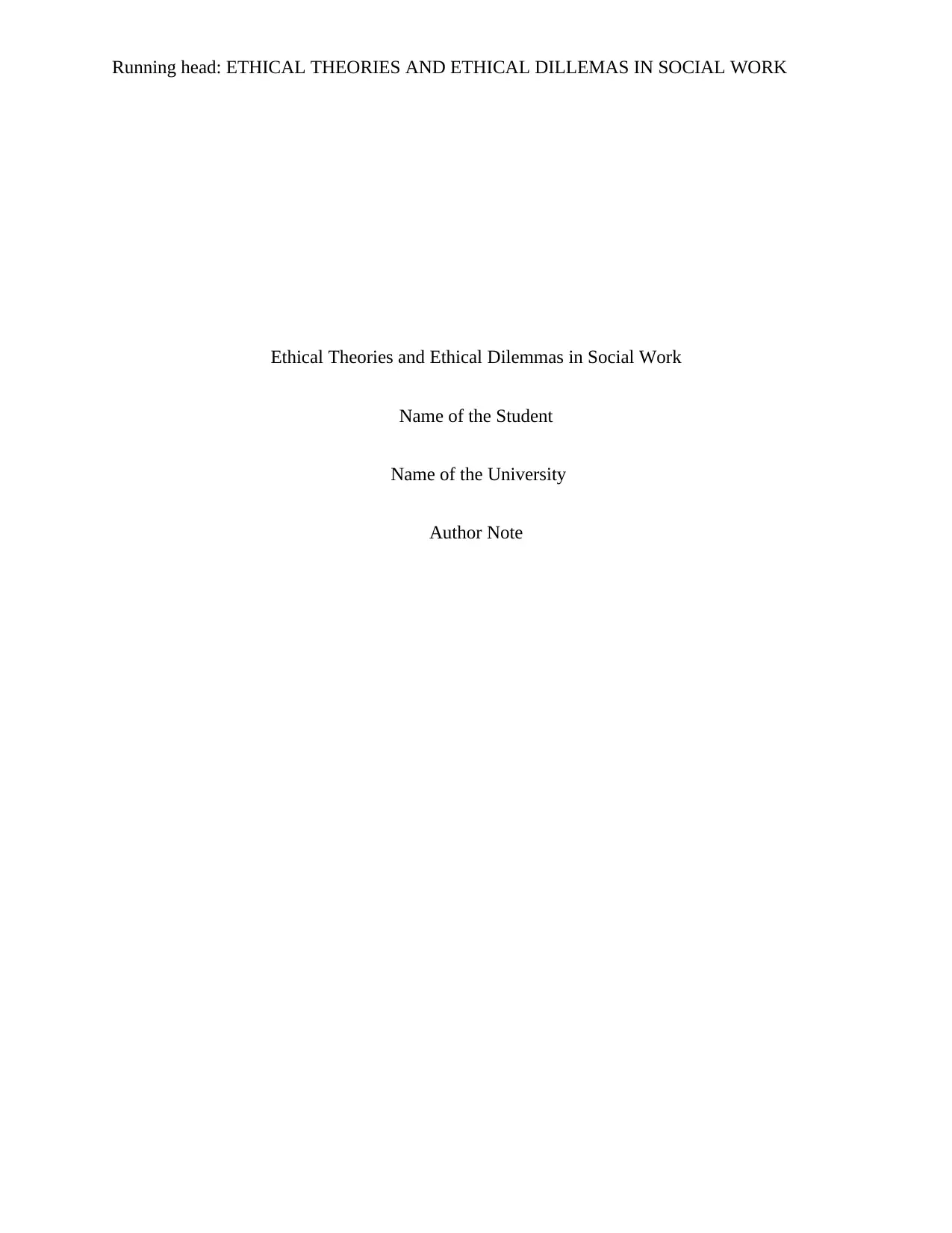
Running head: ETHICAL THEORIES AND ETHICAL DILLEMAS IN SOCIAL WORK
Ethical Theories and Ethical Dilemmas in Social Work
Name of the Student
Name of the University
Author Note
Ethical Theories and Ethical Dilemmas in Social Work
Name of the Student
Name of the University
Author Note
Paraphrase This Document
Need a fresh take? Get an instant paraphrase of this document with our AI Paraphraser
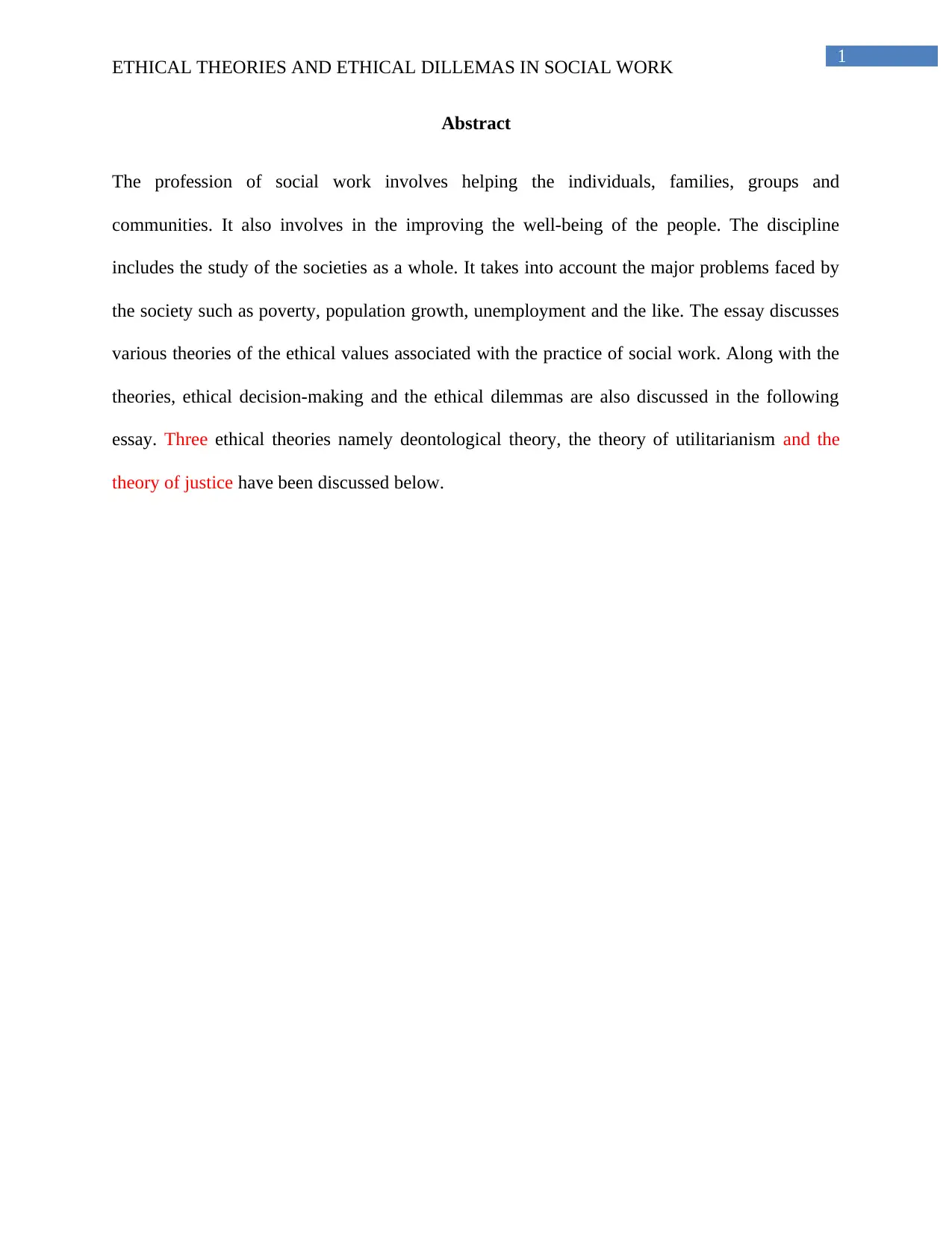
1
ETHICAL THEORIES AND ETHICAL DILLEMAS IN SOCIAL WORK
Abstract
The profession of social work involves helping the individuals, families, groups and
communities. It also involves in the improving the well-being of the people. The discipline
includes the study of the societies as a whole. It takes into account the major problems faced by
the society such as poverty, population growth, unemployment and the like. The essay discusses
various theories of the ethical values associated with the practice of social work. Along with the
theories, ethical decision-making and the ethical dilemmas are also discussed in the following
essay. Three ethical theories namely deontological theory, the theory of utilitarianism and the
theory of justice have been discussed below.
ETHICAL THEORIES AND ETHICAL DILLEMAS IN SOCIAL WORK
Abstract
The profession of social work involves helping the individuals, families, groups and
communities. It also involves in the improving the well-being of the people. The discipline
includes the study of the societies as a whole. It takes into account the major problems faced by
the society such as poverty, population growth, unemployment and the like. The essay discusses
various theories of the ethical values associated with the practice of social work. Along with the
theories, ethical decision-making and the ethical dilemmas are also discussed in the following
essay. Three ethical theories namely deontological theory, the theory of utilitarianism and the
theory of justice have been discussed below.
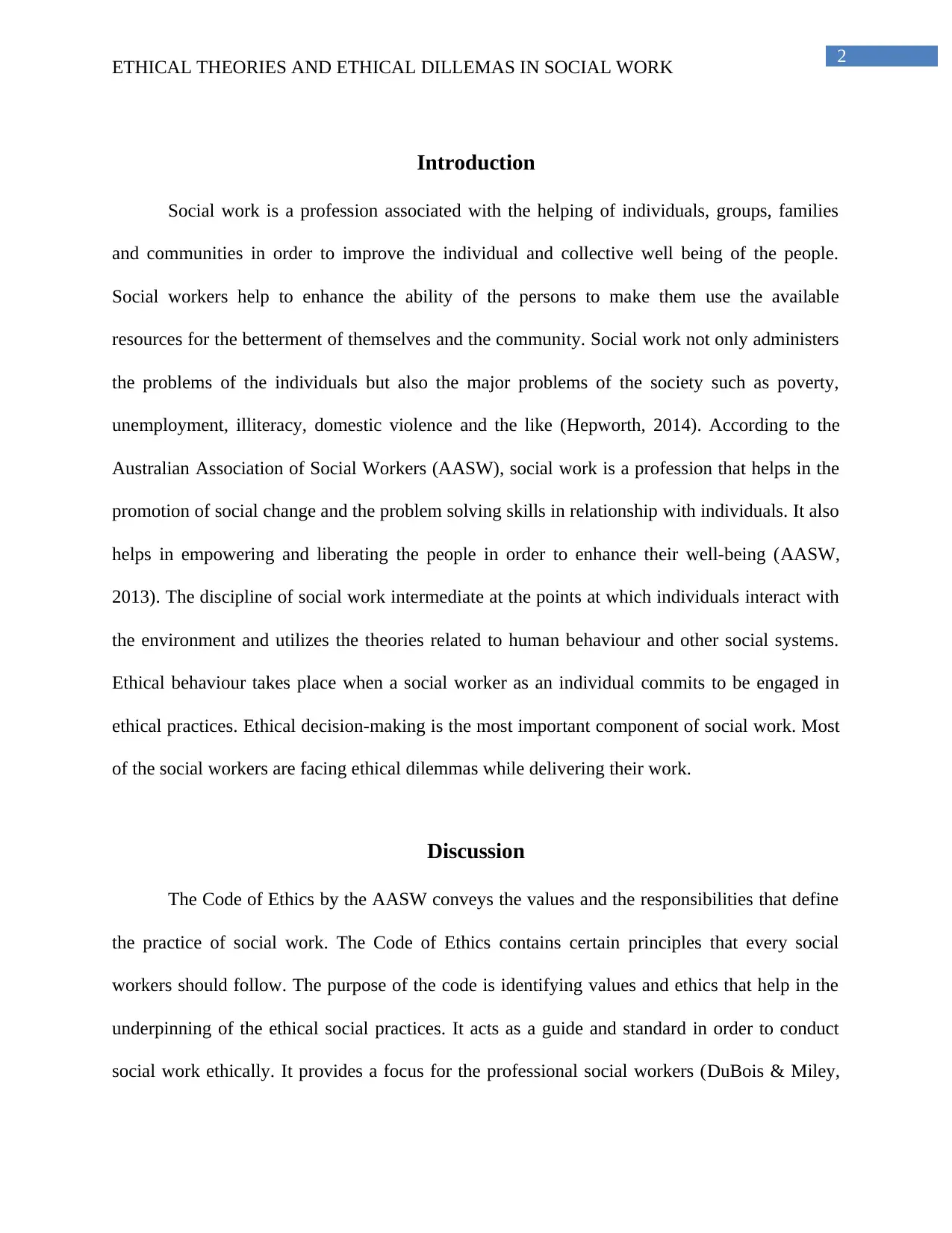
2
ETHICAL THEORIES AND ETHICAL DILLEMAS IN SOCIAL WORK
Introduction
Social work is a profession associated with the helping of individuals, groups, families
and communities in order to improve the individual and collective well being of the people.
Social workers help to enhance the ability of the persons to make them use the available
resources for the betterment of themselves and the community. Social work not only administers
the problems of the individuals but also the major problems of the society such as poverty,
unemployment, illiteracy, domestic violence and the like (Hepworth, 2014). According to the
Australian Association of Social Workers (AASW), social work is a profession that helps in the
promotion of social change and the problem solving skills in relationship with individuals. It also
helps in empowering and liberating the people in order to enhance their well-being (AASW,
2013). The discipline of social work intermediate at the points at which individuals interact with
the environment and utilizes the theories related to human behaviour and other social systems.
Ethical behaviour takes place when a social worker as an individual commits to be engaged in
ethical practices. Ethical decision-making is the most important component of social work. Most
of the social workers are facing ethical dilemmas while delivering their work.
Discussion
The Code of Ethics by the AASW conveys the values and the responsibilities that define
the practice of social work. The Code of Ethics contains certain principles that every social
workers should follow. The purpose of the code is identifying values and ethics that help in the
underpinning of the ethical social practices. It acts as a guide and standard in order to conduct
social work ethically. It provides a focus for the professional social workers (DuBois & Miley,
ETHICAL THEORIES AND ETHICAL DILLEMAS IN SOCIAL WORK
Introduction
Social work is a profession associated with the helping of individuals, groups, families
and communities in order to improve the individual and collective well being of the people.
Social workers help to enhance the ability of the persons to make them use the available
resources for the betterment of themselves and the community. Social work not only administers
the problems of the individuals but also the major problems of the society such as poverty,
unemployment, illiteracy, domestic violence and the like (Hepworth, 2014). According to the
Australian Association of Social Workers (AASW), social work is a profession that helps in the
promotion of social change and the problem solving skills in relationship with individuals. It also
helps in empowering and liberating the people in order to enhance their well-being (AASW,
2013). The discipline of social work intermediate at the points at which individuals interact with
the environment and utilizes the theories related to human behaviour and other social systems.
Ethical behaviour takes place when a social worker as an individual commits to be engaged in
ethical practices. Ethical decision-making is the most important component of social work. Most
of the social workers are facing ethical dilemmas while delivering their work.
Discussion
The Code of Ethics by the AASW conveys the values and the responsibilities that define
the practice of social work. The Code of Ethics contains certain principles that every social
workers should follow. The purpose of the code is identifying values and ethics that help in the
underpinning of the ethical social practices. It acts as a guide and standard in order to conduct
social work ethically. It provides a focus for the professional social workers (DuBois & Miley,
⊘ This is a preview!⊘
Do you want full access?
Subscribe today to unlock all pages.

Trusted by 1+ million students worldwide
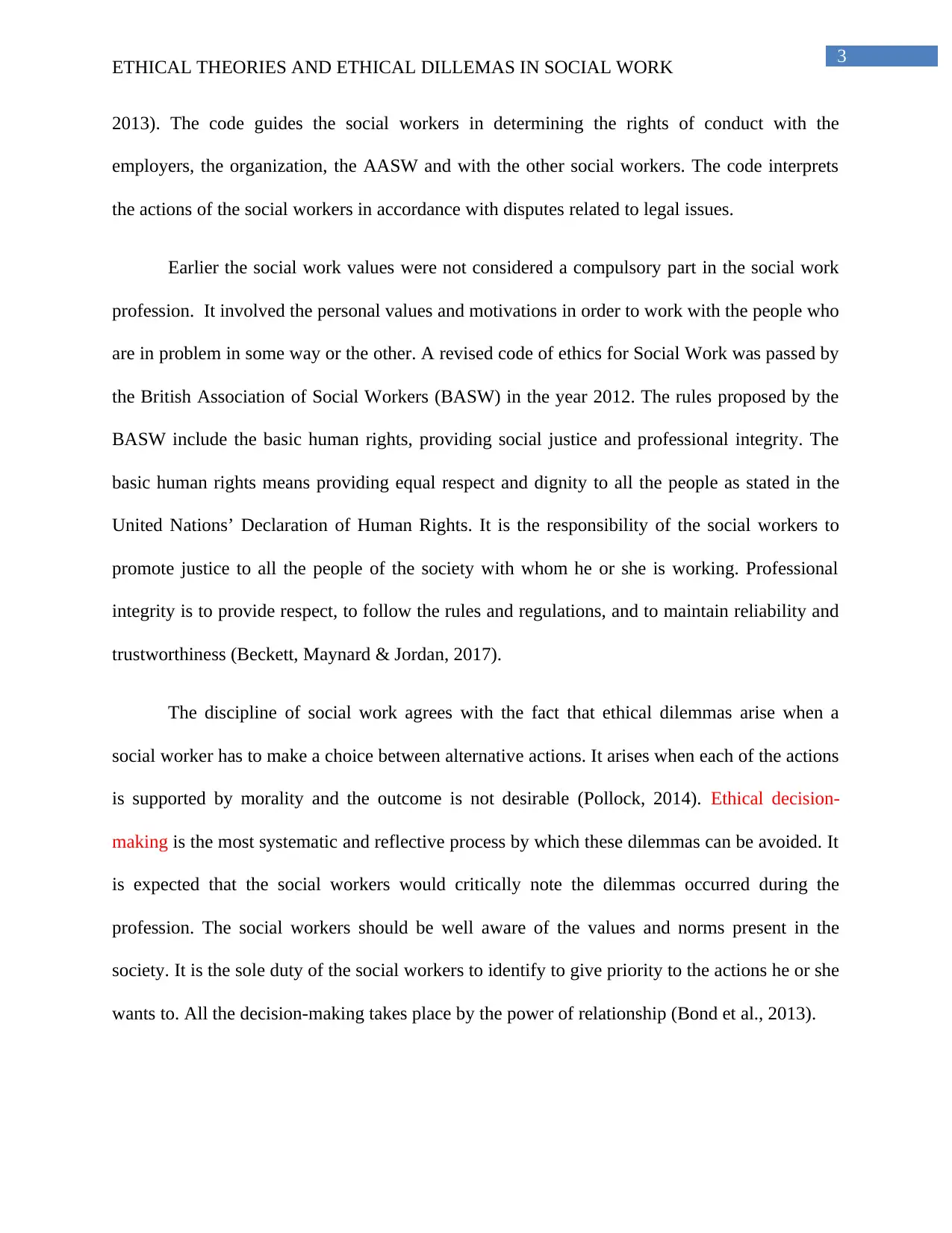
3
ETHICAL THEORIES AND ETHICAL DILLEMAS IN SOCIAL WORK
2013). The code guides the social workers in determining the rights of conduct with the
employers, the organization, the AASW and with the other social workers. The code interprets
the actions of the social workers in accordance with disputes related to legal issues.
Earlier the social work values were not considered a compulsory part in the social work
profession. It involved the personal values and motivations in order to work with the people who
are in problem in some way or the other. A revised code of ethics for Social Work was passed by
the British Association of Social Workers (BASW) in the year 2012. The rules proposed by the
BASW include the basic human rights, providing social justice and professional integrity. The
basic human rights means providing equal respect and dignity to all the people as stated in the
United Nations’ Declaration of Human Rights. It is the responsibility of the social workers to
promote justice to all the people of the society with whom he or she is working. Professional
integrity is to provide respect, to follow the rules and regulations, and to maintain reliability and
trustworthiness (Beckett, Maynard & Jordan, 2017).
The discipline of social work agrees with the fact that ethical dilemmas arise when a
social worker has to make a choice between alternative actions. It arises when each of the actions
is supported by morality and the outcome is not desirable (Pollock, 2014). Ethical decision-
making is the most systematic and reflective process by which these dilemmas can be avoided. It
is expected that the social workers would critically note the dilemmas occurred during the
profession. The social workers should be well aware of the values and norms present in the
society. It is the sole duty of the social workers to identify to give priority to the actions he or she
wants to. All the decision-making takes place by the power of relationship (Bond et al., 2013).
ETHICAL THEORIES AND ETHICAL DILLEMAS IN SOCIAL WORK
2013). The code guides the social workers in determining the rights of conduct with the
employers, the organization, the AASW and with the other social workers. The code interprets
the actions of the social workers in accordance with disputes related to legal issues.
Earlier the social work values were not considered a compulsory part in the social work
profession. It involved the personal values and motivations in order to work with the people who
are in problem in some way or the other. A revised code of ethics for Social Work was passed by
the British Association of Social Workers (BASW) in the year 2012. The rules proposed by the
BASW include the basic human rights, providing social justice and professional integrity. The
basic human rights means providing equal respect and dignity to all the people as stated in the
United Nations’ Declaration of Human Rights. It is the responsibility of the social workers to
promote justice to all the people of the society with whom he or she is working. Professional
integrity is to provide respect, to follow the rules and regulations, and to maintain reliability and
trustworthiness (Beckett, Maynard & Jordan, 2017).
The discipline of social work agrees with the fact that ethical dilemmas arise when a
social worker has to make a choice between alternative actions. It arises when each of the actions
is supported by morality and the outcome is not desirable (Pollock, 2014). Ethical decision-
making is the most systematic and reflective process by which these dilemmas can be avoided. It
is expected that the social workers would critically note the dilemmas occurred during the
profession. The social workers should be well aware of the values and norms present in the
society. It is the sole duty of the social workers to identify to give priority to the actions he or she
wants to. All the decision-making takes place by the power of relationship (Bond et al., 2013).
Paraphrase This Document
Need a fresh take? Get an instant paraphrase of this document with our AI Paraphraser
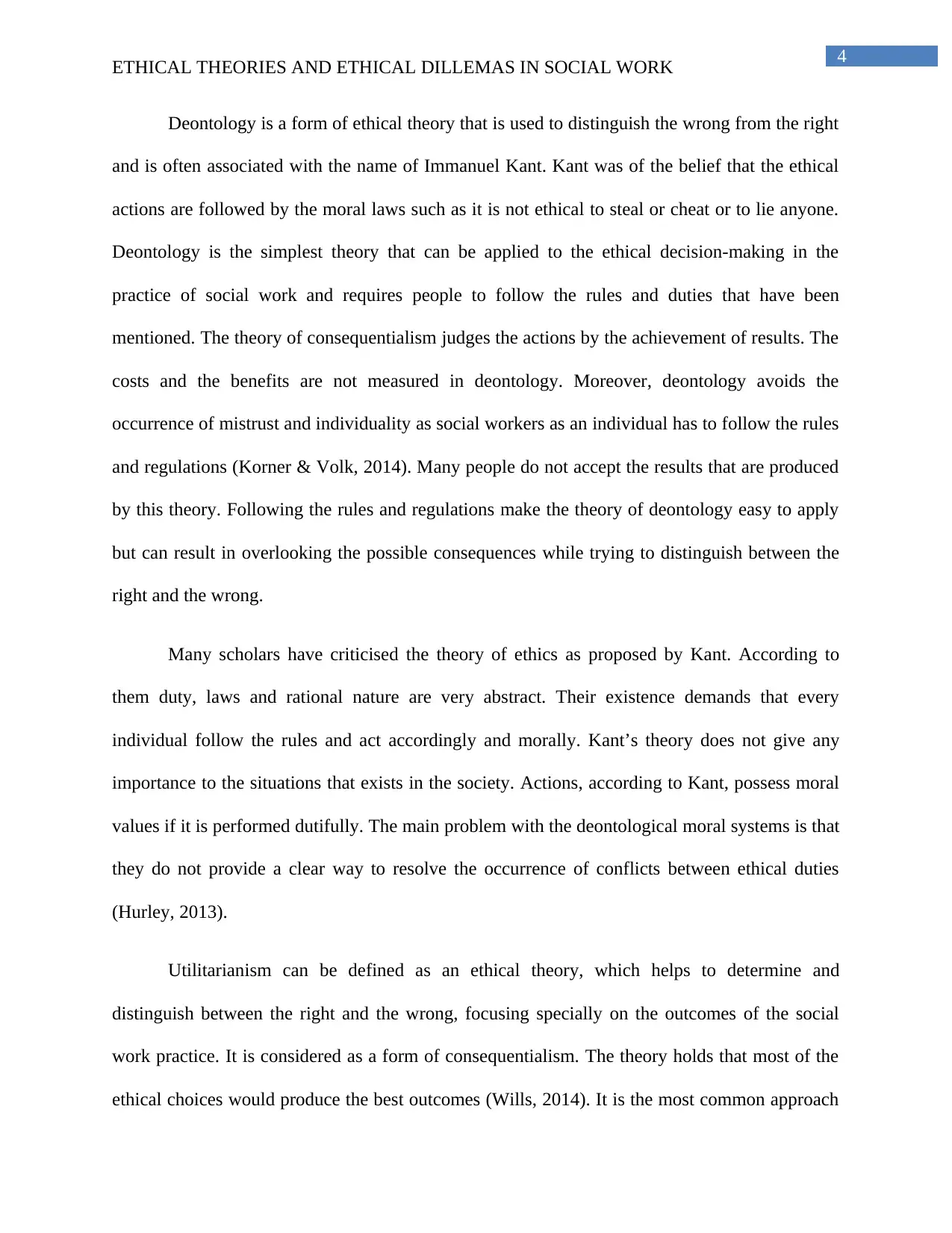
4
ETHICAL THEORIES AND ETHICAL DILLEMAS IN SOCIAL WORK
Deontology is a form of ethical theory that is used to distinguish the wrong from the right
and is often associated with the name of Immanuel Kant. Kant was of the belief that the ethical
actions are followed by the moral laws such as it is not ethical to steal or cheat or to lie anyone.
Deontology is the simplest theory that can be applied to the ethical decision-making in the
practice of social work and requires people to follow the rules and duties that have been
mentioned. The theory of consequentialism judges the actions by the achievement of results. The
costs and the benefits are not measured in deontology. Moreover, deontology avoids the
occurrence of mistrust and individuality as social workers as an individual has to follow the rules
and regulations (Korner & Volk, 2014). Many people do not accept the results that are produced
by this theory. Following the rules and regulations make the theory of deontology easy to apply
but can result in overlooking the possible consequences while trying to distinguish between the
right and the wrong.
Many scholars have criticised the theory of ethics as proposed by Kant. According to
them duty, laws and rational nature are very abstract. Their existence demands that every
individual follow the rules and act accordingly and morally. Kant’s theory does not give any
importance to the situations that exists in the society. Actions, according to Kant, possess moral
values if it is performed dutifully. The main problem with the deontological moral systems is that
they do not provide a clear way to resolve the occurrence of conflicts between ethical duties
(Hurley, 2013).
Utilitarianism can be defined as an ethical theory, which helps to determine and
distinguish between the right and the wrong, focusing specially on the outcomes of the social
work practice. It is considered as a form of consequentialism. The theory holds that most of the
ethical choices would produce the best outcomes (Wills, 2014). It is the most common approach
ETHICAL THEORIES AND ETHICAL DILLEMAS IN SOCIAL WORK
Deontology is a form of ethical theory that is used to distinguish the wrong from the right
and is often associated with the name of Immanuel Kant. Kant was of the belief that the ethical
actions are followed by the moral laws such as it is not ethical to steal or cheat or to lie anyone.
Deontology is the simplest theory that can be applied to the ethical decision-making in the
practice of social work and requires people to follow the rules and duties that have been
mentioned. The theory of consequentialism judges the actions by the achievement of results. The
costs and the benefits are not measured in deontology. Moreover, deontology avoids the
occurrence of mistrust and individuality as social workers as an individual has to follow the rules
and regulations (Korner & Volk, 2014). Many people do not accept the results that are produced
by this theory. Following the rules and regulations make the theory of deontology easy to apply
but can result in overlooking the possible consequences while trying to distinguish between the
right and the wrong.
Many scholars have criticised the theory of ethics as proposed by Kant. According to
them duty, laws and rational nature are very abstract. Their existence demands that every
individual follow the rules and act accordingly and morally. Kant’s theory does not give any
importance to the situations that exists in the society. Actions, according to Kant, possess moral
values if it is performed dutifully. The main problem with the deontological moral systems is that
they do not provide a clear way to resolve the occurrence of conflicts between ethical duties
(Hurley, 2013).
Utilitarianism can be defined as an ethical theory, which helps to determine and
distinguish between the right and the wrong, focusing specially on the outcomes of the social
work practice. It is considered as a form of consequentialism. The theory holds that most of the
ethical choices would produce the best outcomes (Wills, 2014). It is the most common approach
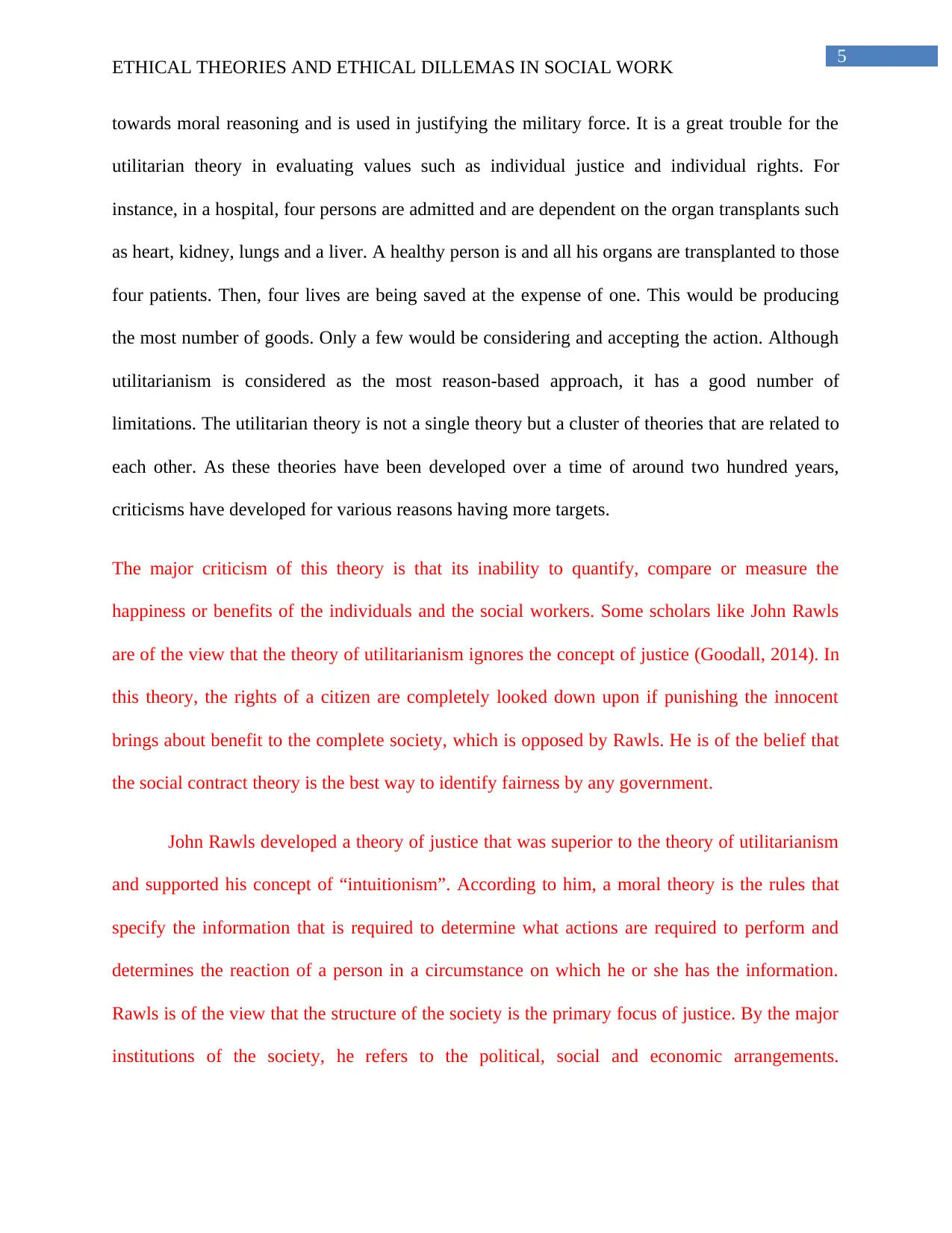
5
ETHICAL THEORIES AND ETHICAL DILLEMAS IN SOCIAL WORK
towards moral reasoning and is used in justifying the military force. It is a great trouble for the
utilitarian theory in evaluating values such as individual justice and individual rights. For
instance, in a hospital, four persons are admitted and are dependent on the organ transplants such
as heart, kidney, lungs and a liver. A healthy person is and all his organs are transplanted to those
four patients. Then, four lives are being saved at the expense of one. This would be producing
the most number of goods. Only a few would be considering and accepting the action. Although
utilitarianism is considered as the most reason-based approach, it has a good number of
limitations. The utilitarian theory is not a single theory but a cluster of theories that are related to
each other. As these theories have been developed over a time of around two hundred years,
criticisms have developed for various reasons having more targets.
The major criticism of this theory is that its inability to quantify, compare or measure the
happiness or benefits of the individuals and the social workers. Some scholars like John Rawls
are of the view that the theory of utilitarianism ignores the concept of justice (Goodall, 2014). In
this theory, the rights of a citizen are completely looked down upon if punishing the innocent
brings about benefit to the complete society, which is opposed by Rawls. He is of the belief that
the social contract theory is the best way to identify fairness by any government.
John Rawls developed a theory of justice that was superior to the theory of utilitarianism
and supported his concept of “intuitionism”. According to him, a moral theory is the rules that
specify the information that is required to determine what actions are required to perform and
determines the reaction of a person in a circumstance on which he or she has the information.
Rawls is of the view that the structure of the society is the primary focus of justice. By the major
institutions of the society, he refers to the political, social and economic arrangements.
ETHICAL THEORIES AND ETHICAL DILLEMAS IN SOCIAL WORK
towards moral reasoning and is used in justifying the military force. It is a great trouble for the
utilitarian theory in evaluating values such as individual justice and individual rights. For
instance, in a hospital, four persons are admitted and are dependent on the organ transplants such
as heart, kidney, lungs and a liver. A healthy person is and all his organs are transplanted to those
four patients. Then, four lives are being saved at the expense of one. This would be producing
the most number of goods. Only a few would be considering and accepting the action. Although
utilitarianism is considered as the most reason-based approach, it has a good number of
limitations. The utilitarian theory is not a single theory but a cluster of theories that are related to
each other. As these theories have been developed over a time of around two hundred years,
criticisms have developed for various reasons having more targets.
The major criticism of this theory is that its inability to quantify, compare or measure the
happiness or benefits of the individuals and the social workers. Some scholars like John Rawls
are of the view that the theory of utilitarianism ignores the concept of justice (Goodall, 2014). In
this theory, the rights of a citizen are completely looked down upon if punishing the innocent
brings about benefit to the complete society, which is opposed by Rawls. He is of the belief that
the social contract theory is the best way to identify fairness by any government.
John Rawls developed a theory of justice that was superior to the theory of utilitarianism
and supported his concept of “intuitionism”. According to him, a moral theory is the rules that
specify the information that is required to determine what actions are required to perform and
determines the reaction of a person in a circumstance on which he or she has the information.
Rawls is of the view that the structure of the society is the primary focus of justice. By the major
institutions of the society, he refers to the political, social and economic arrangements.
⊘ This is a preview!⊘
Do you want full access?
Subscribe today to unlock all pages.

Trusted by 1+ million students worldwide
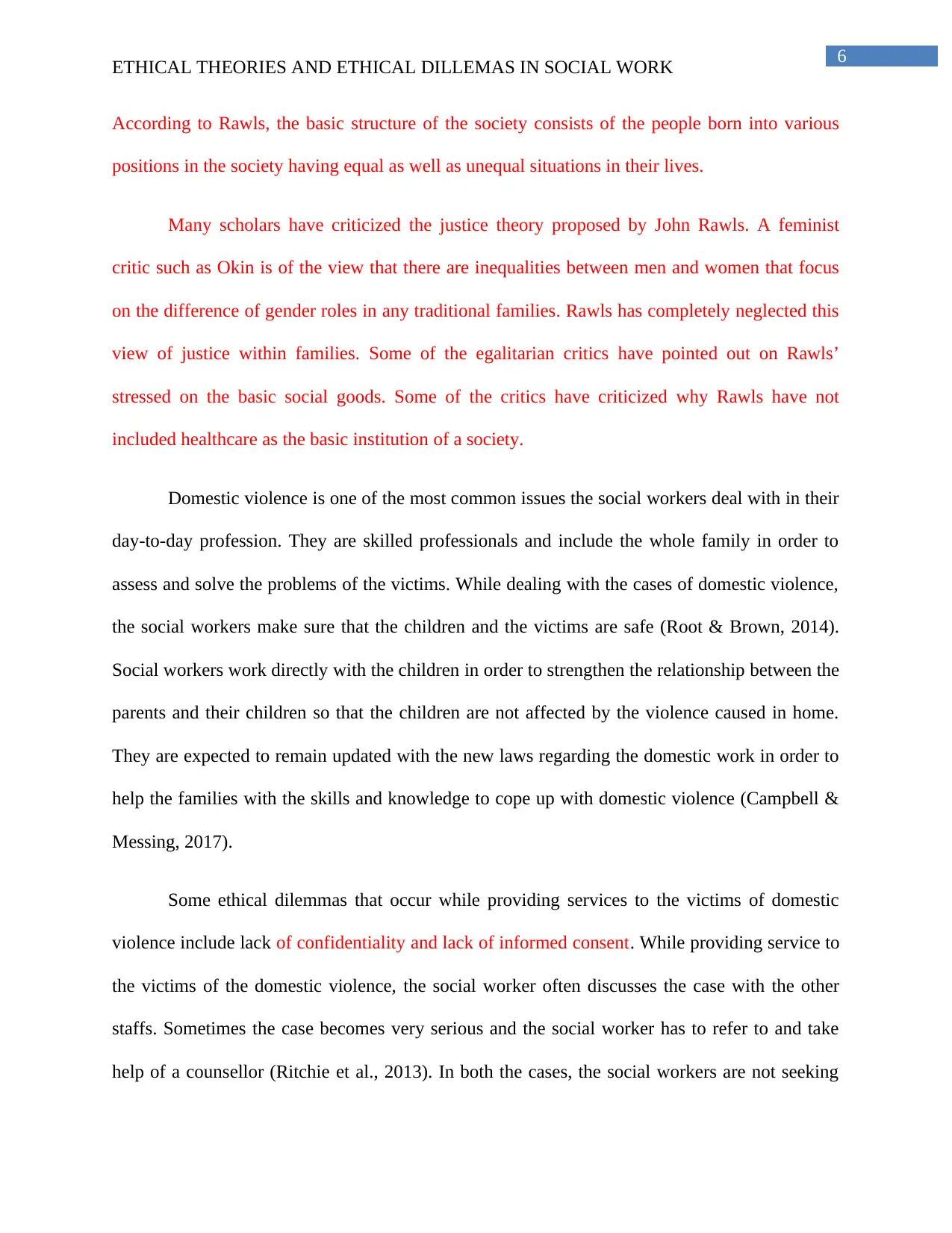
6
ETHICAL THEORIES AND ETHICAL DILLEMAS IN SOCIAL WORK
According to Rawls, the basic structure of the society consists of the people born into various
positions in the society having equal as well as unequal situations in their lives.
Many scholars have criticized the justice theory proposed by John Rawls. A feminist
critic such as Okin is of the view that there are inequalities between men and women that focus
on the difference of gender roles in any traditional families. Rawls has completely neglected this
view of justice within families. Some of the egalitarian critics have pointed out on Rawls’
stressed on the basic social goods. Some of the critics have criticized why Rawls have not
included healthcare as the basic institution of a society.
Domestic violence is one of the most common issues the social workers deal with in their
day-to-day profession. They are skilled professionals and include the whole family in order to
assess and solve the problems of the victims. While dealing with the cases of domestic violence,
the social workers make sure that the children and the victims are safe (Root & Brown, 2014).
Social workers work directly with the children in order to strengthen the relationship between the
parents and their children so that the children are not affected by the violence caused in home.
They are expected to remain updated with the new laws regarding the domestic work in order to
help the families with the skills and knowledge to cope up with domestic violence (Campbell &
Messing, 2017).
Some ethical dilemmas that occur while providing services to the victims of domestic
violence include lack of confidentiality and lack of informed consent. While providing service to
the victims of the domestic violence, the social worker often discusses the case with the other
staffs. Sometimes the case becomes very serious and the social worker has to refer to and take
help of a counsellor (Ritchie et al., 2013). In both the cases, the social workers are not seeking
ETHICAL THEORIES AND ETHICAL DILLEMAS IN SOCIAL WORK
According to Rawls, the basic structure of the society consists of the people born into various
positions in the society having equal as well as unequal situations in their lives.
Many scholars have criticized the justice theory proposed by John Rawls. A feminist
critic such as Okin is of the view that there are inequalities between men and women that focus
on the difference of gender roles in any traditional families. Rawls has completely neglected this
view of justice within families. Some of the egalitarian critics have pointed out on Rawls’
stressed on the basic social goods. Some of the critics have criticized why Rawls have not
included healthcare as the basic institution of a society.
Domestic violence is one of the most common issues the social workers deal with in their
day-to-day profession. They are skilled professionals and include the whole family in order to
assess and solve the problems of the victims. While dealing with the cases of domestic violence,
the social workers make sure that the children and the victims are safe (Root & Brown, 2014).
Social workers work directly with the children in order to strengthen the relationship between the
parents and their children so that the children are not affected by the violence caused in home.
They are expected to remain updated with the new laws regarding the domestic work in order to
help the families with the skills and knowledge to cope up with domestic violence (Campbell &
Messing, 2017).
Some ethical dilemmas that occur while providing services to the victims of domestic
violence include lack of confidentiality and lack of informed consent. While providing service to
the victims of the domestic violence, the social worker often discusses the case with the other
staffs. Sometimes the case becomes very serious and the social worker has to refer to and take
help of a counsellor (Ritchie et al., 2013). In both the cases, the social workers are not seeking
Paraphrase This Document
Need a fresh take? Get an instant paraphrase of this document with our AI Paraphraser
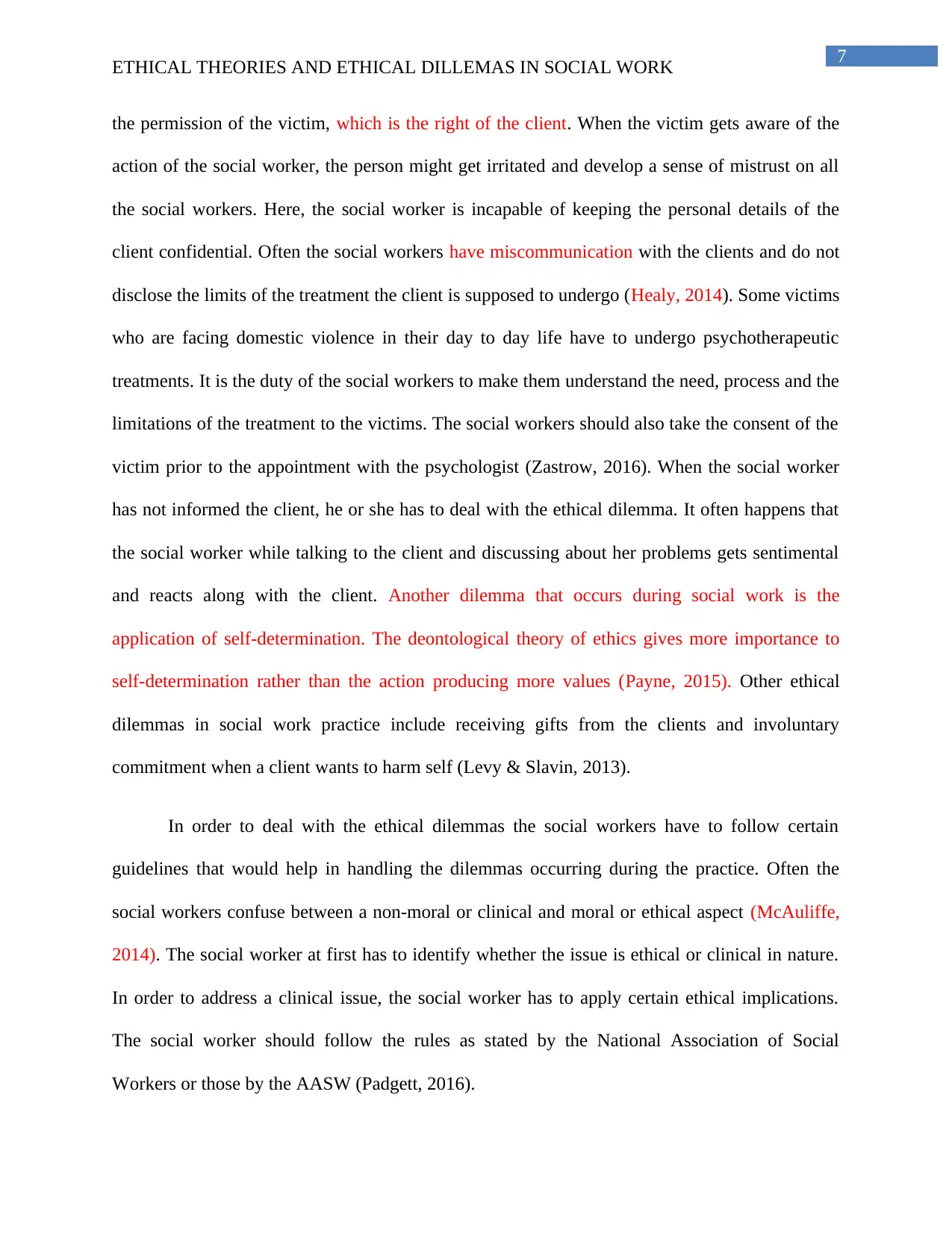
7
ETHICAL THEORIES AND ETHICAL DILLEMAS IN SOCIAL WORK
the permission of the victim, which is the right of the client. When the victim gets aware of the
action of the social worker, the person might get irritated and develop a sense of mistrust on all
the social workers. Here, the social worker is incapable of keeping the personal details of the
client confidential. Often the social workers have miscommunication with the clients and do not
disclose the limits of the treatment the client is supposed to undergo (Healy, 2014). Some victims
who are facing domestic violence in their day to day life have to undergo psychotherapeutic
treatments. It is the duty of the social workers to make them understand the need, process and the
limitations of the treatment to the victims. The social workers should also take the consent of the
victim prior to the appointment with the psychologist (Zastrow, 2016). When the social worker
has not informed the client, he or she has to deal with the ethical dilemma. It often happens that
the social worker while talking to the client and discussing about her problems gets sentimental
and reacts along with the client. Another dilemma that occurs during social work is the
application of self-determination. The deontological theory of ethics gives more importance to
self-determination rather than the action producing more values (Payne, 2015). Other ethical
dilemmas in social work practice include receiving gifts from the clients and involuntary
commitment when a client wants to harm self (Levy & Slavin, 2013).
In order to deal with the ethical dilemmas the social workers have to follow certain
guidelines that would help in handling the dilemmas occurring during the practice. Often the
social workers confuse between a non-moral or clinical and moral or ethical aspect (McAuliffe,
2014). The social worker at first has to identify whether the issue is ethical or clinical in nature.
In order to address a clinical issue, the social worker has to apply certain ethical implications.
The social worker should follow the rules as stated by the National Association of Social
Workers or those by the AASW (Padgett, 2016).
ETHICAL THEORIES AND ETHICAL DILLEMAS IN SOCIAL WORK
the permission of the victim, which is the right of the client. When the victim gets aware of the
action of the social worker, the person might get irritated and develop a sense of mistrust on all
the social workers. Here, the social worker is incapable of keeping the personal details of the
client confidential. Often the social workers have miscommunication with the clients and do not
disclose the limits of the treatment the client is supposed to undergo (Healy, 2014). Some victims
who are facing domestic violence in their day to day life have to undergo psychotherapeutic
treatments. It is the duty of the social workers to make them understand the need, process and the
limitations of the treatment to the victims. The social workers should also take the consent of the
victim prior to the appointment with the psychologist (Zastrow, 2016). When the social worker
has not informed the client, he or she has to deal with the ethical dilemma. It often happens that
the social worker while talking to the client and discussing about her problems gets sentimental
and reacts along with the client. Another dilemma that occurs during social work is the
application of self-determination. The deontological theory of ethics gives more importance to
self-determination rather than the action producing more values (Payne, 2015). Other ethical
dilemmas in social work practice include receiving gifts from the clients and involuntary
commitment when a client wants to harm self (Levy & Slavin, 2013).
In order to deal with the ethical dilemmas the social workers have to follow certain
guidelines that would help in handling the dilemmas occurring during the practice. Often the
social workers confuse between a non-moral or clinical and moral or ethical aspect (McAuliffe,
2014). The social worker at first has to identify whether the issue is ethical or clinical in nature.
In order to address a clinical issue, the social worker has to apply certain ethical implications.
The social worker should follow the rules as stated by the National Association of Social
Workers or those by the AASW (Padgett, 2016).
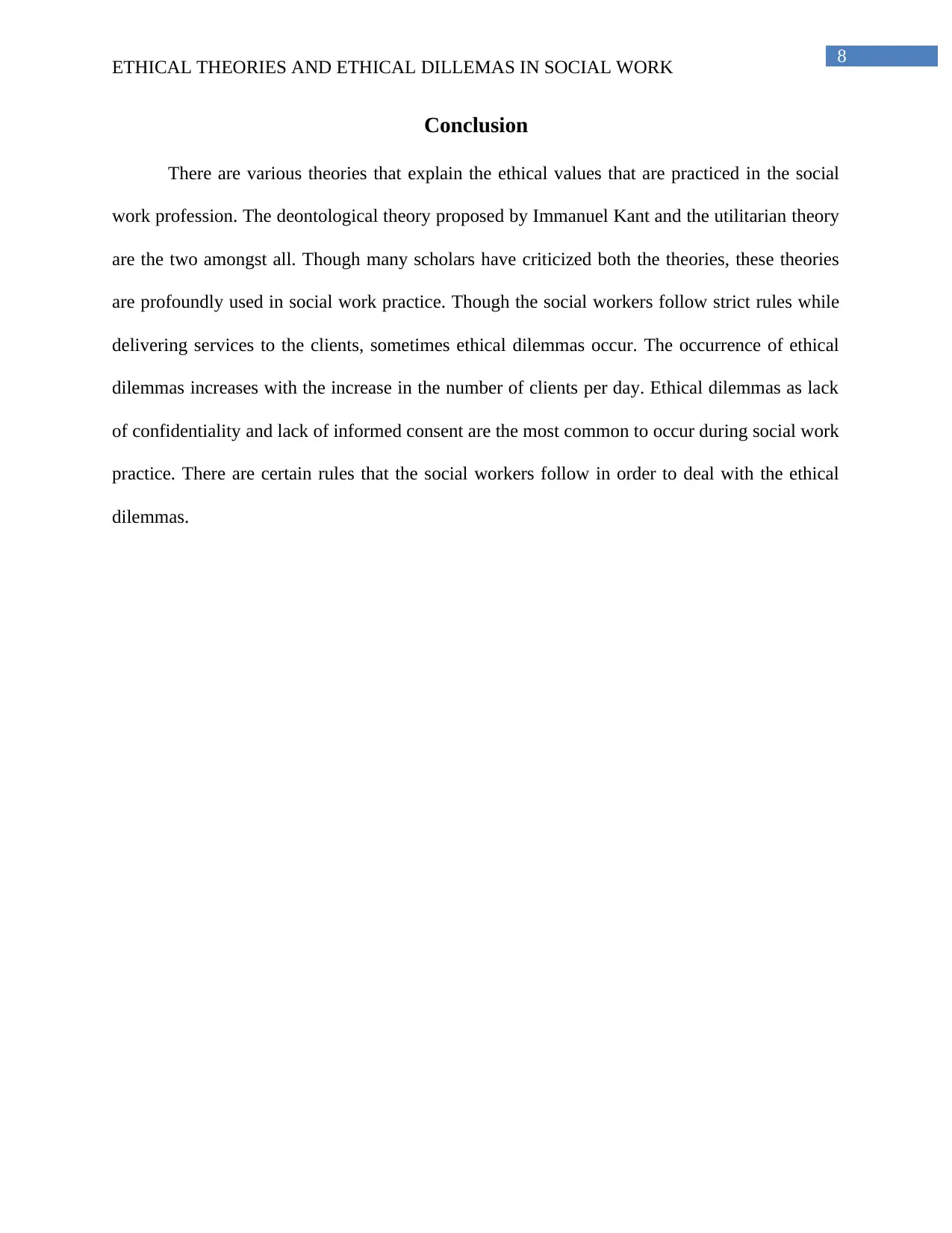
8
ETHICAL THEORIES AND ETHICAL DILLEMAS IN SOCIAL WORK
Conclusion
There are various theories that explain the ethical values that are practiced in the social
work profession. The deontological theory proposed by Immanuel Kant and the utilitarian theory
are the two amongst all. Though many scholars have criticized both the theories, these theories
are profoundly used in social work practice. Though the social workers follow strict rules while
delivering services to the clients, sometimes ethical dilemmas occur. The occurrence of ethical
dilemmas increases with the increase in the number of clients per day. Ethical dilemmas as lack
of confidentiality and lack of informed consent are the most common to occur during social work
practice. There are certain rules that the social workers follow in order to deal with the ethical
dilemmas.
ETHICAL THEORIES AND ETHICAL DILLEMAS IN SOCIAL WORK
Conclusion
There are various theories that explain the ethical values that are practiced in the social
work profession. The deontological theory proposed by Immanuel Kant and the utilitarian theory
are the two amongst all. Though many scholars have criticized both the theories, these theories
are profoundly used in social work practice. Though the social workers follow strict rules while
delivering services to the clients, sometimes ethical dilemmas occur. The occurrence of ethical
dilemmas increases with the increase in the number of clients per day. Ethical dilemmas as lack
of confidentiality and lack of informed consent are the most common to occur during social work
practice. There are certain rules that the social workers follow in order to deal with the ethical
dilemmas.
⊘ This is a preview!⊘
Do you want full access?
Subscribe today to unlock all pages.

Trusted by 1+ million students worldwide
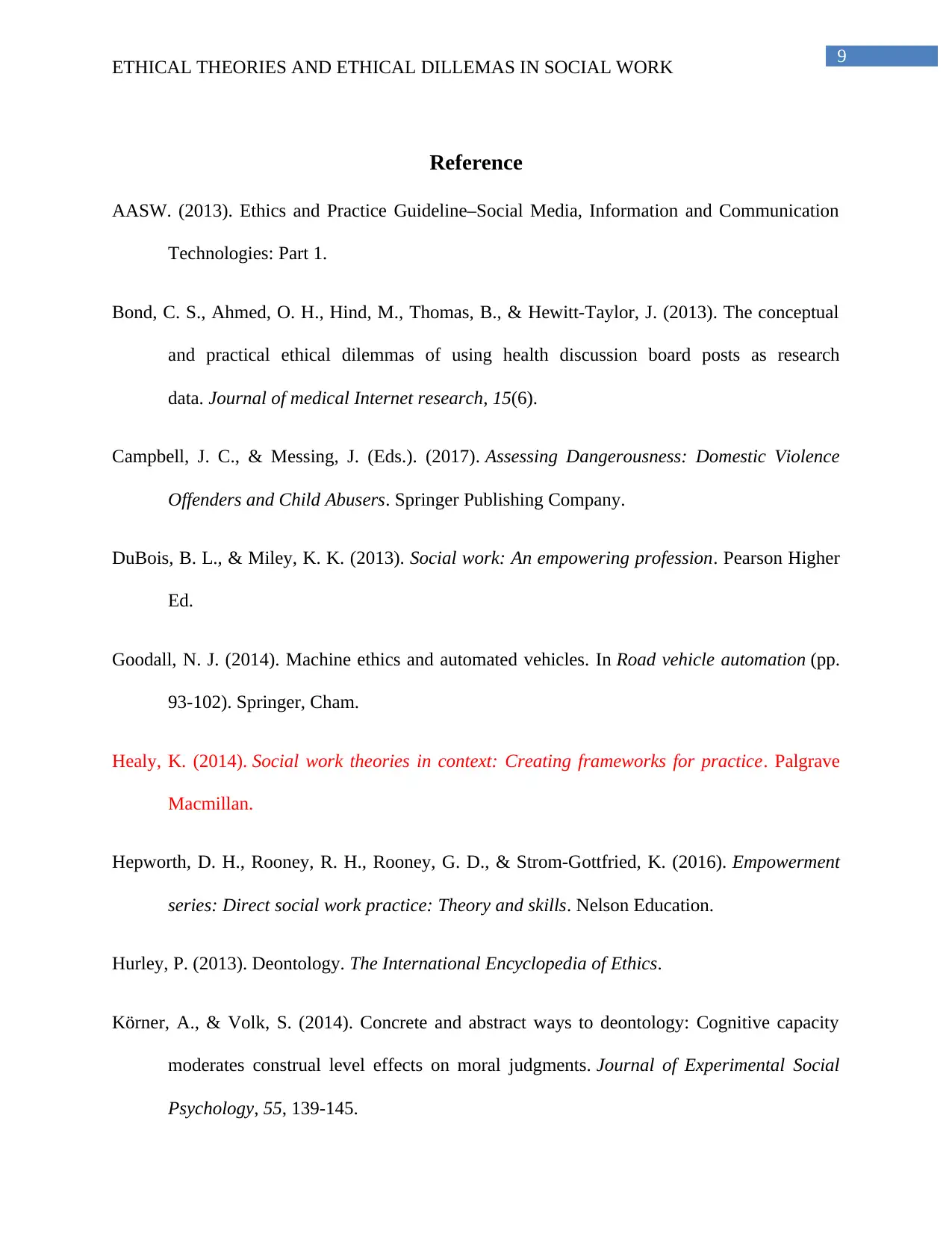
9
ETHICAL THEORIES AND ETHICAL DILLEMAS IN SOCIAL WORK
Reference
AASW. (2013). Ethics and Practice Guideline–Social Media, Information and Communication
Technologies: Part 1.
Bond, C. S., Ahmed, O. H., Hind, M., Thomas, B., & Hewitt-Taylor, J. (2013). The conceptual
and practical ethical dilemmas of using health discussion board posts as research
data. Journal of medical Internet research, 15(6).
Campbell, J. C., & Messing, J. (Eds.). (2017). Assessing Dangerousness: Domestic Violence
Offenders and Child Abusers. Springer Publishing Company.
DuBois, B. L., & Miley, K. K. (2013). Social work: An empowering profession. Pearson Higher
Ed.
Goodall, N. J. (2014). Machine ethics and automated vehicles. In Road vehicle automation (pp.
93-102). Springer, Cham.
Healy, K. (2014). Social work theories in context: Creating frameworks for practice. Palgrave
Macmillan.
Hepworth, D. H., Rooney, R. H., Rooney, G. D., & Strom-Gottfried, K. (2016). Empowerment
series: Direct social work practice: Theory and skills. Nelson Education.
Hurley, P. (2013). Deontology. The International Encyclopedia of Ethics.
Körner, A., & Volk, S. (2014). Concrete and abstract ways to deontology: Cognitive capacity
moderates construal level effects on moral judgments. Journal of Experimental Social
Psychology, 55, 139-145.
ETHICAL THEORIES AND ETHICAL DILLEMAS IN SOCIAL WORK
Reference
AASW. (2013). Ethics and Practice Guideline–Social Media, Information and Communication
Technologies: Part 1.
Bond, C. S., Ahmed, O. H., Hind, M., Thomas, B., & Hewitt-Taylor, J. (2013). The conceptual
and practical ethical dilemmas of using health discussion board posts as research
data. Journal of medical Internet research, 15(6).
Campbell, J. C., & Messing, J. (Eds.). (2017). Assessing Dangerousness: Domestic Violence
Offenders and Child Abusers. Springer Publishing Company.
DuBois, B. L., & Miley, K. K. (2013). Social work: An empowering profession. Pearson Higher
Ed.
Goodall, N. J. (2014). Machine ethics and automated vehicles. In Road vehicle automation (pp.
93-102). Springer, Cham.
Healy, K. (2014). Social work theories in context: Creating frameworks for practice. Palgrave
Macmillan.
Hepworth, D. H., Rooney, R. H., Rooney, G. D., & Strom-Gottfried, K. (2016). Empowerment
series: Direct social work practice: Theory and skills. Nelson Education.
Hurley, P. (2013). Deontology. The International Encyclopedia of Ethics.
Körner, A., & Volk, S. (2014). Concrete and abstract ways to deontology: Cognitive capacity
moderates construal level effects on moral judgments. Journal of Experimental Social
Psychology, 55, 139-145.
Paraphrase This Document
Need a fresh take? Get an instant paraphrase of this document with our AI Paraphraser
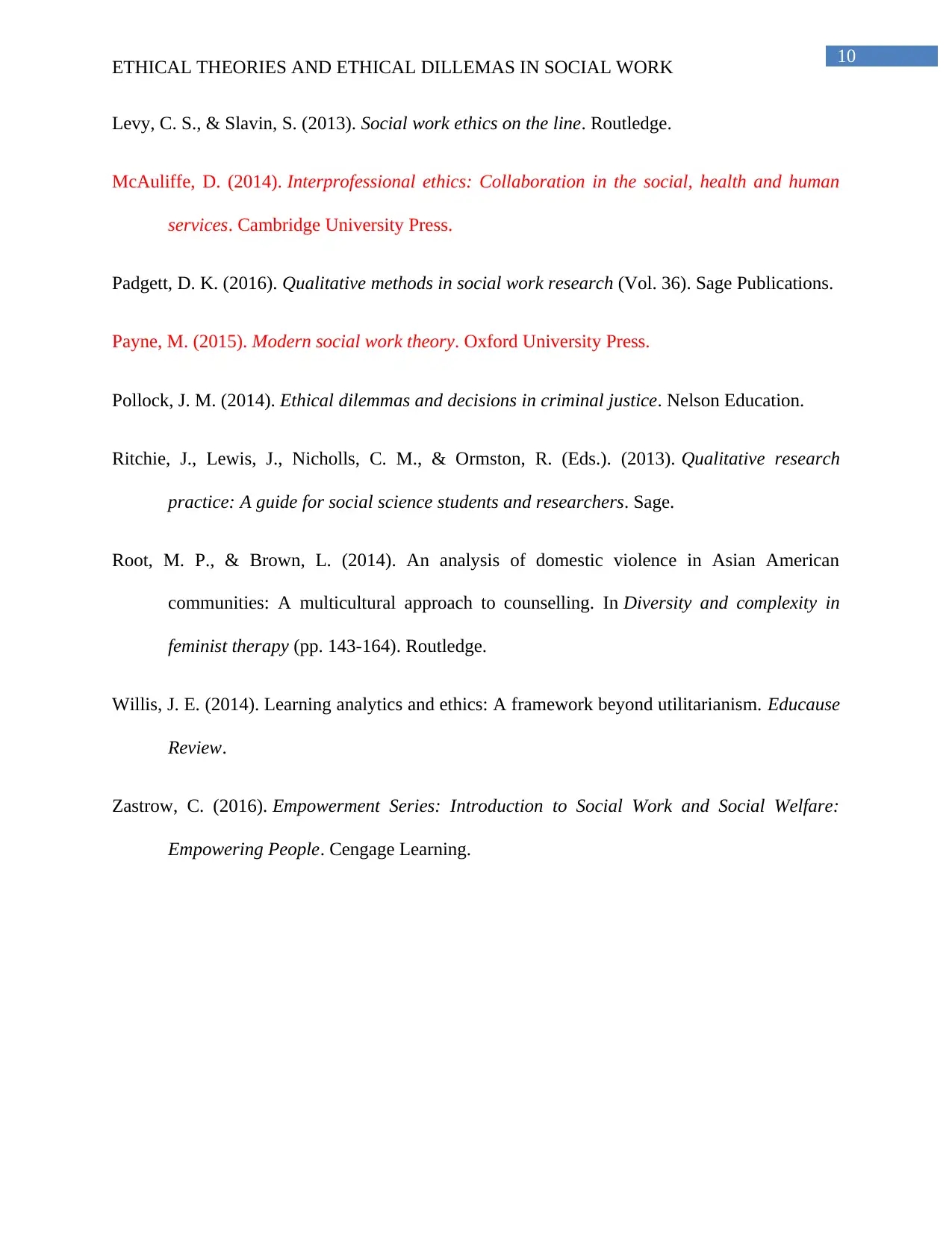
10
ETHICAL THEORIES AND ETHICAL DILLEMAS IN SOCIAL WORK
Levy, C. S., & Slavin, S. (2013). Social work ethics on the line. Routledge.
McAuliffe, D. (2014). Interprofessional ethics: Collaboration in the social, health and human
services. Cambridge University Press.
Padgett, D. K. (2016). Qualitative methods in social work research (Vol. 36). Sage Publications.
Payne, M. (2015). Modern social work theory. Oxford University Press.
Pollock, J. M. (2014). Ethical dilemmas and decisions in criminal justice. Nelson Education.
Ritchie, J., Lewis, J., Nicholls, C. M., & Ormston, R. (Eds.). (2013). Qualitative research
practice: A guide for social science students and researchers. Sage.
Root, M. P., & Brown, L. (2014). An analysis of domestic violence in Asian American
communities: A multicultural approach to counselling. In Diversity and complexity in
feminist therapy (pp. 143-164). Routledge.
Willis, J. E. (2014). Learning analytics and ethics: A framework beyond utilitarianism. Educause
Review.
Zastrow, C. (2016). Empowerment Series: Introduction to Social Work and Social Welfare:
Empowering People. Cengage Learning.
ETHICAL THEORIES AND ETHICAL DILLEMAS IN SOCIAL WORK
Levy, C. S., & Slavin, S. (2013). Social work ethics on the line. Routledge.
McAuliffe, D. (2014). Interprofessional ethics: Collaboration in the social, health and human
services. Cambridge University Press.
Padgett, D. K. (2016). Qualitative methods in social work research (Vol. 36). Sage Publications.
Payne, M. (2015). Modern social work theory. Oxford University Press.
Pollock, J. M. (2014). Ethical dilemmas and decisions in criminal justice. Nelson Education.
Ritchie, J., Lewis, J., Nicholls, C. M., & Ormston, R. (Eds.). (2013). Qualitative research
practice: A guide for social science students and researchers. Sage.
Root, M. P., & Brown, L. (2014). An analysis of domestic violence in Asian American
communities: A multicultural approach to counselling. In Diversity and complexity in
feminist therapy (pp. 143-164). Routledge.
Willis, J. E. (2014). Learning analytics and ethics: A framework beyond utilitarianism. Educause
Review.
Zastrow, C. (2016). Empowerment Series: Introduction to Social Work and Social Welfare:
Empowering People. Cengage Learning.
1 out of 11
Related Documents
Your All-in-One AI-Powered Toolkit for Academic Success.
+13062052269
info@desklib.com
Available 24*7 on WhatsApp / Email
![[object Object]](/_next/static/media/star-bottom.7253800d.svg)
Unlock your academic potential
Copyright © 2020–2026 A2Z Services. All Rights Reserved. Developed and managed by ZUCOL.




